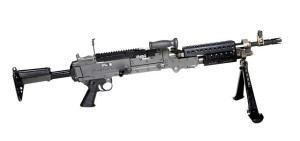 As a Grand Rapids, MI estate and legacy planning attorney, I am always researching ways to better protect, preserve, and pass on my clients’ legacies in the way they want. In some cases, this may mean protecting and preserving a prized firearm or a firearm collection.
As a Grand Rapids, MI estate and legacy planning attorney, I am always researching ways to better protect, preserve, and pass on my clients’ legacies in the way they want. In some cases, this may mean protecting and preserving a prized firearm or a firearm collection.
Think about it for a moment . . . there are four million members of the National Rifle Association (NRA) and an estimated 270+ million firearms in this country. Many families also have guns and other weapons as heirlooms that they would like to keep in the family and pass down from generation to generation. Although some may think their estate plan (or lack thereof) will “take care of” their firearms, sadly, many will find out that is not the case . . . and they will find out too late to do anything about it.
You see, firearms present some unique challenges. The National Firearms Act (NFA) as well as state and local laws strictly regulate possession of certain weapons and may affect the transfer of permissible weapons. For example, convicted felons, those with a history of mental illness, persons convicted of misdemeanor domestic violence offenses, convicted users of illegal drugs, dishonorably discharged veterans, and persons who have renounced their U.S. citizenship are not allowed to own or possess certain weapons.
When an estate includes firearms or other weapons, the executor must be careful to avoid violating these laws. Transferring a weapon to an heir to fulfill a bequest could subject the executor and/or the heir to criminal penalties. Just having a weapon appraised could result in its seizure. An out-of-state heir creates even more problems.
A revocable living trust designed specifically for the ownership, transfer and possession of weapons (commonly known as a gun, NFA or firearm trust) can avoid some of the problems or at least make them manageable. A corporation or LLC can also be used to own weapons, but trusts do not require annual filing fees, public disclosure or a separate tax return. Here are some of the main points:
- The trust is the owner of the weapons.
- The trust document must be carefully written to account for the different types of weapons held and comply with the applicable laws.
- The name of the trust, once established, should not be changed. Because the regulated weapon is registered in the trust’s name, a change in the name of the trust would require that it be re-registered and a transfer tax paid.
- The trust can name several trustees, each of whom may lawfully possess the weapon without triggering transfer requirements. (Persons not allowed by law to own or have access to the weapons in the trust are not eligible to be a trustee.)
- Weapons can be purchased by a trustee to avoid having to pay a transfer tax.
- Once a weapon becomes a trust asset, any beneficiary (including a minor child) may use it. However, the trustee is still responsible to determine the capacity of the beneficiary to use it.
- Unlike a traditional revocable living trust which can be revoked at any time by the creator of the trust, the Bureau of Alcohol, Tobacco, Firearms and Explosives (BATFE) must approve the termination of a gun trust and the distribution of its assets to the beneficiaries.
- No regulated weapons held in the trust may be transported across state lines without prior BATFE approval.
- Also, since weapon laws vary from state to state, gun trusts may not be valid from one state to another as a traditional revocable living trust would be.
As you can see, one mis-step in a Michigan gun trust can have disastrous results for those involved (and possibly others). Give us a call at 616-827-7596 to help make sure you are protecting, preserving, and passing on the legacy you want and that you don’t “mis-fire” with your firearms in your planning.
Michael Lichterman is an estate planning and business planning attorney who helps families and business owners create a lasting legacy by planning for their Whole Family Wealth™. This goes beyond merely planning for finances – it’s about who your are and what’s important to you. He focuses on estate and asset protection planning for the “experienced” generation, the “sandwich generation” (caring for parents and children), doctors/physicians, nurses, lawyers, dentists, professionals with minor children, family owned businesses and pet planning. He takes the “counselor” part of attorney and counselor at law very seriously, and enjoys creating life long relationships with his clients – many of which have become great friends.

 As a
As a